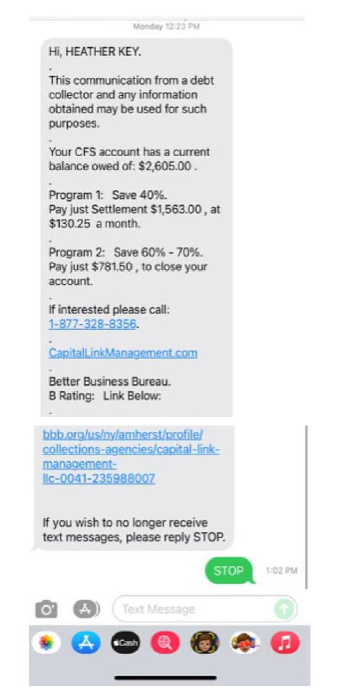EDITOR’S NOTE: This article is part of a series that is sponsored by WebRecon. WebRecon identifies serial plaintiffs lurking in your database BEFORE you contact them and expose yourself to a likely lawsuit. Protect your company from as many as one in three new consumer lawsuits by scrubbing your consumers through WebRecon first. Want to learn more? Call (855) WEB-RECON or email [email protected] today! Thanks to WebRecon for sponsoring this series.
DISCLAIMER: This article is based on a complaint. The defendant has not responded to the complaint to present its side of the case. The claims mentioned are accusations and should be considered as such until and unless proven otherwise.
A collector is being accused by a plaintiff of violating Regulation F and the Fair Debt Collection Practices Act by not honoring the plaintiff’s opt-out of receiving text messages, by not waiting seven days following a conversation before initiating another call, and failing to send a notice in writing after the initial communication.
A copy of the complaint, filed in the District Court for the Eastern District of Texas can be accessed by using case number 22-cv-00154.
Background: The plaintiff allegedly received a phone call on her cell phone while at work. She did not answer the call, and a second call followed immediately thereafter. She answered that call, and allegedly started asking questions about who was calling, and the representative of the defendant said he was collecting on a Ford Fiesta. The plaintiff allegedly tried to ask more questions but the representative “talked over her in an intimidating manner,” according to the complaint. The plaintiff hung up, and the defendant placed two more calls in rapid succession.
- Similar patterns were followed the day after the initial call and four days later.
- After the calls started, the plaintiff began receiving text messages, seeking to settle the debt. The text messages included an opt-out disclosure, which the plaintiff allegedly sought to invoke. Three times the plaintiff received a text message about the debt, and three times she allegedly revoked consent to be contacted.

The Claims: The plaintiff claims the defendant violated Sections 1692d(5), 1692e, and 1692g of the FDCPA and Sections 1006.6(e) and 1006.14(2)(ii) of Regulation F.









